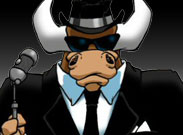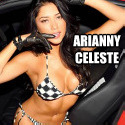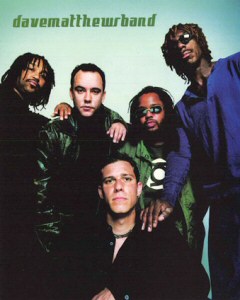Dave Matthews Band
Entertainers Home / Entertainment Channel
ALSO! Don't miss our DMB Deep Cuts.
The Dave Matthews Band probably won’t take a place among the most influential rock bands of all time. Their enormous popularity in America might never reach the uber level of U2. But perhaps history will judge them as one of the most accurate representations of post Cold War, pre 9/11 American music and culture, when history seemed to have ended, when suddenly all that mattered was finding the “best of what’s around,” as the fatalism of imminent nuclear apocalypse slowly gave way to a truer appreciation of the joy of music, friends, hanging out, gettin’ high, hooking up, exploring life, and the perfect combination of all of it, before the world re-intruded.
History
Dave Matthews was born in South Africa, where the rhythm of African life, culture and music all around him inevitably found its way into his musical expression. After his family moved to Charlottesville, VA, that quintessential college town mixed with Dave’s experience as a bartender there with his African roots to deliver a unique songwriting voice that was probably destined to be the soundtrack of every 20-something of the time. The core lineup of the band was formed in 1991, with local jazz musicians Carter Beauford on drums and Boyd Tinsley on violin, and then 19-year-old Stefan Lessard on bass.
Their following grew from bar to bar, with the self-released debut of Remember Two Things rapidly leading to their first major label effort Under the Table and Dreaming in 1994, which produced the first hit singles “What Would You Say” and the seminal “Ants Marching,” a song which both perfectly captures DMB’s signature sound as well as every recent college grad’s existential wondering as they entered the rat race.
Touring constantly throughout the 1990s, DMB’s incredible live sound became the target of bootleggers, who then became the target of DMB, which virtually shut the bootlegging industry down by both legal means and the release of live recordings. Their first live album, 1997’s Live at Red Rocks, is widely considered their best. The 1996 studio effort Crash was a blockbuster and a critical success, with the title track becoming a huge hit. In 1998, DMB released Before These Crowded Streets, which yielded the radio friendly “Stay.” Another live album came out in 1999, Listener Supported.
All along the way, Dave collaborated with many musicians, most prominently guitarist Tim Reynolds. The two released their acoustic performance on Live at Luther College, an intimate two man show that gave Dave a chance to emphasize the strength of the songwriting and his vocals.
In 2001, DMB released Live at Chicago, and the studio album Everyday, whose title song Dave played solo during the televised concert for 9/11 victims just days after the attack. Throughout 2001, and 2002, Busted Stuff leaked out piece by piece (much of it showing up on The Lillywhite Sessions) as fans anticipated what would become their best studio album. 2002 and 2003 saw the release of two more live albums, The Central Park Concert and Live at Folsom Field, each opening with what many consider Dave’s most powerful live vocal performance, “Don’t Drink The Water.” Dave also released his first solo album Some Devil in 2003, featuring the Grammy award winning single “Gravedigger.”
The band became politically active in 2004, joining the Vote for Change tour, and becoming a lead sponsor of the jam band voter registration effort HeadCount. They released another live album, The Gorge, in 2004. The band’s latest studio effort, Stand Up, came out in May 2005.
Comments
I joined the DMB tour in 2004 as a voter registration coordinator, which gave me the chance to see 13 shows in a row, the last three at the Gorge in Washington. Their live performances have become part of the American fabric, drawing a diverse crowd of college kids, parents and hippies, and have become the best way to experience the music.
Carter Beauford, the drummer, is the best musician in the band, and probably the best drummer who ever lived. He has the technical prowess of Neil Peart, the raw energy and force of Keith Moon, and the ear for the musicality of a drum kit of Stewart Copeland. DMB’s music often leaves a lot of space for someone to fill, and most often it is Carter who fills it, effortlessly – I once saw him blowing bubble gum in the middle of a solo. The best way to appreciate Carter’s drumming is to listen to “Drive In, Drive Out,” off of Crash, where he unloads such complex virtuosity that fits so perfectly with the band, it’s hard to comprehend a machine executing it, let alone a human being imagining it. At the end of the recording, the band realizes what he’s just done, and just laughs, with someone saying, “Damn, that is some hot SHIT!”
If you’ve never really gotten into DMB and are looking for a good first album, I’d recommend Crash, which has received a lot of radio play. A good first live album is Live at Red Rocks. If you’re in a mellow acoustic mood, you can’t beat Live at Luther College. If you’re looking for info on the band online, you’ll find plenty. DMB’s popularity coincided with the dawn of the internet, and fan sites, as well as the official site, reflect that.
Where is DMB going from here? Hard to say. They’ve been touring constantly since the band formed, and they must be ready for a break. Dave and Boyd Tinsley have done solo projects and collaborations. The latest studio album, Stand Up, hasn’t gotten rave reviews from fans (including this one). The band remains engaged politically, which could drive their inspiration for some time…Stand Up certainly took a cue from the outside world. The supernova energy that the band rode for years is ebbing, and another turn in the road may be imminent. But whatever happens next, I’m sure it will be greatly anticipated.
 Tired of striking out? Check out these Dating Tips for all sorts of advice on how to finally get the girl! Also, we tell you all about some of the best online dating sites and how you can use them to hook up with more women!
Tired of striking out? Check out these Dating Tips for all sorts of advice on how to finally get the girl! Also, we tell you all about some of the best online dating sites and how you can use them to hook up with more women!
Too Much to Say
On CGI film characters:
"It's easy to fool the eye but it's hard to fool the heart."
On acting:
"The actor becomes an emotional athlete. The process is painful--my personal life suffers."
On fame:
"You hate to say you get used to it, because you don't really get used to it, but it gets easier. You accept it more. And you finally have to become more comfortable with it. That's what's happened to me, I think."








